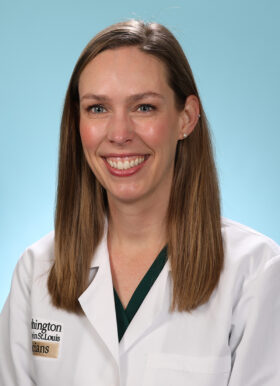Maggie Dwiggins, MD, MS

Maggie Dwiggins, MD, MS, is a pediatric and adolescent gynecologist. She sees patients at:
Barnes-Jewish Center for Outpatient Health
4901 Forest Park Avenue
Suite 710
St. Louis, MO 63018
Missouri Baptist Medical Center – Building D
3023 N. Ballas Road
Suite 450
St. Louis, MO 63131
Memorial Hospital Shiloh
Washington University Pediatric Specialty Care
1414 Cross Street
Suite 140B
Shiloh, IL 62269
To schedule an appointment, please call 314-273-4724.
What during your training led you to choose your specialty?
I have always been interested in reproductive health care of girls and young women, and when I entered residency, I was especially drawn to those adolescent and young adult patients with gynecologic cancers. Initially, I thought I would go into gynecologic oncology. However, once I did my first oncology rotation, I quickly learned that this population was not typically served by gynecologic oncology. Instead, pediatric surgery and pediatric gynecology saw these patients. My assistant program director encouraged me to do a rotation in pediatric and adolescent gynecology (PAG). I spent a month working with Dr. Holly Hoefgen during my third year of residency, and I was hooked! I found I immensely enjoyed working with this population in general, and the variety in complaints and ages kept clinic days interesting.
What brought you to Washington University?
My husband and I grew up in Charleston, Ill., which is only two hours away. We have a number of family members in St. Louis as well. Dr. Hoefgen and I have been collaborating since I was in fellowship, and I have admired her and Dr. Diane Merritt for a long time. When I became pregnant with our second baby, we started to think about moving closer to home. Dr. Hoefgen mentioned she had a position, and after interviewing I knew this was the perfect place to be. There is an enormous need for PAG in this area and such great support from WashU for providing care and advancing research. It seemed like the best place to be happy in my career, as well as being close to family.
Which aspect of your practice is most interesting?
Everything! I enjoy surgery a lot; there are so many interesting cases in this field. The collaboration with pediatric surgery and urology is also phenomenal, which allows us to be involved in a lot of complex anomalies.
How does a provider’s training impact patient outcomes?
This specialty is full of “zebras,” meaning there are many conditions that are only seen a handful of times. By completing a fellowship in a high-volume center like Children’s National in Washington, D.C., I gained experience with many of these conditions and collaborated with a number of multidisciplinary clinics along the way. This allowed me to understand how to evaluate my patients, consult other specialties and, most importantly, operate safely. Even though I did a rotation in residency, and we cared for many adolescent patients, I would never have been as proficient as I am now without completing a fellowship.
Are there any other new developments in your field that you are excited about?
We have created a fellows research consortium with the North American Society of Pediatric and Adolescent Gynecology (NASPAG) and have some really great multi-center research projects starting up. These projects will allow us to understand some of the rarer conditions and anomalies and how to best treat our patients.
Which particular award or achievement is most gratifying?
In 2022, my friend and mentor Paige Hertweck, MD, and I published our book Clinical Protocols in Pediatric and Adolescent Gynecology. We wrote several chapters and were the editors, and we convinced many experts in the field to contribute as well. The end result is something I am proud of. The book is streamlined and informative and can be used by any specialty that takes care of these patients.
What is the best advice you’ve received?
My fellowship program director used to remind me to remember that we all make mistakes. She does, I do, the patients, their guardians, the referring providers —everyone. By remembering this, we give ourselves and each other grace and space to have failures, setbacks and disappointments. This also places less pressure on us to be perfect all the time, which allows us to more quickly identify and acknowledge when something has gone wrong or could have been better and move forward. I find that this has been helpful in my personal life and with my patients. I always take time for internal reflection to see if a proposed plan is achievable by identifying barriers to success, even if it’s simply choosing the right birth control or period product.
If you weren’t a doctor, what would you like to be doing?
I would probably be attempting to make a living as a travel food writer. This would be a dream, to be able to travel to places and eat all the best food as a job!
Specialty services in Illinois are provided by Washington University Physicians in Illinois, Inc., which is an Illinois nonprofit 501(c)(3) corporation that provides services exclusively in Illinois and is affiliated with Washington University.